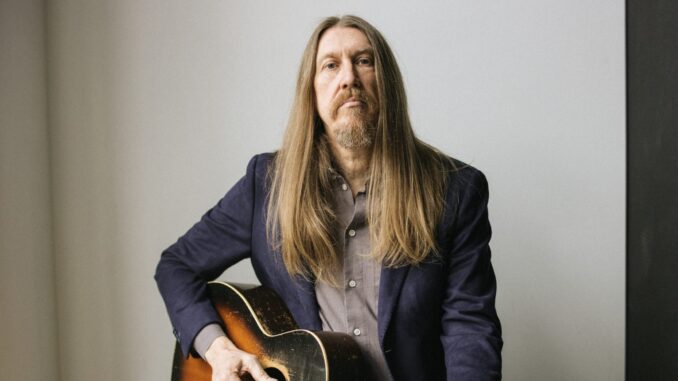
An important truth: Life was meant to be lived; songs were meant to be experienced.
Oliver Wood continues to earn his reputation as a committed songwriter. Never mind the fact that he’s been refining his craft for the better part of 30 years. Here he is again, pulling over to the side of the freeway for gas, taking a break in between tours and recordings by the in-demand Wood Brothers band he fronts with his brother Chris and multi-instrumentalist Jono Rix, to put out a second solo record called “Fat Cat Silhouette.” This is the same individual who named his first solo album “Always Smilin’” and if this particular image doesn’t confirm his goals for making music, it’s hard to imagine what else would.
It came on the heels of The Wood Brothers’ eighth album, “Heart is the Hero,” released in 2023 with perhaps more of an acoustic flavour in its songs. Wood’s strengths have always been subtlety and restraint. With Fat Cat, he has crafted something solid and mature, if not altogether trailblazing.
“I grew up listening to the folk songs our father played,” said Wood, recalling his introduction to live music coming from his father playing guitar and singing during get-togethers. His dad was a folk singer who played with John Hartford and Joan Baez. He set aside music for a career as a scientist to support his family.
Bill Wood passed earlier this year in the middle of The Wood Brothers’ tour. That there was little time to mourn between losing his dad in May to a record release in June may have been a blessing. Staying busy has its advantages, especially when doing something that made his father proud.
The new album opens with ‘Light and Sweet,’ which is how Oliver Wood takes his coffee mornings while sitting in his armchair, notebook at hand, staring out the window where the fat cat’s silhouette had appeared, the significance of which he’d prefer keeping to himself. In this case, a bird outside the window was the initial image that turned the key in the ignition and stated the motor of inspiration. “From there it was just imagining a human-like story for him,” he explained, “and how it relates to other scenarios where people just do human things and have human problems and make judgements.”
Instead of making in essence another Wood Brothers album, but solo, he went against the grain to test and evaluate all sorts of unusual time signatures, rhythms, vocals substituting for instruments, fife and drum, atonal distorted guitar, in short, a kitchen sink of sounds to provide a counterbalance to his familiar voice and unmistakable songwriting. Guests were invited to his Nashville studio. Marcus Henderson and Steve Berlin joining in a circle jam with Wood and Rix on ‘Whom I Adore.’ Ric Roberson co-wrote ‘Somebody Blues,’ which Wood laconically described as “obviously about loss.” Katie Pruitt sang a duet with him on ‘Have You No Shame,” which is a cover of a song written by one of Wood’s mentors, the legendary Atlanta musician and chicken coop percussionist Donnie McCormick.
You get the impression Oliver Wood prizes a sense of place, whether his surroundings are where he grew up in Colorado, his next home in Atlanta playing with King Johnson to his current home in Nashville. Atlanta was where he and his brother collided on the same bill with King Johnson supporting Medeski, Martin & Wood. The genesis of the Wood Brothers band has been retold many times. But suffice to say, they aren’t intending to splinter up anytime soon.
The new album is a course change, a brief respite from the band and an invitation to discover the art hidden within uncharted territories like an intrepid sailor setting sail to the vast sea of possibility. One of those possibilities is heard in the 6/8 African beats of ‘Little Worries.’ It’s impossible not to be reminded of Paul Simon’s “Graceland.” (You can hear Wood playing the riff for the song in this short Instagram video.) This is the song inspired by the mystifying fat cat, whose silhouette he glimpsed “sprawlin’ sideways in my armchair all akimbo.”
Whether it’s in The Wood Brothers or him solo, Oliver Wood’s music never seems rushed, instead carefully considered and handpicked, yet casual and joyous. “I love the way it turned out,” he said, gratified, “and I’m certainly blessed to have the friends and resources to do something like this in between Wood Brothers projects.
Good morning, Nashville. Hello, Oliver Wood.
Hi, Dean. Are you in North Carolina near to where the hurricane came through?
No, the next state over in East Tennessee. Too close for comfort.
It’s awful. Unbelievable. I have so many friends up there I’ve been hearing from and some that I couldn’t reach.
It must be strange to have maybe seen people you know from the Asheville region, Seth Walker is from there I believe, seen them in Nashville a week ago and now where are they?
Yeah, he sure is. Seth is kind of stranded up there right now. He was supposed to be in Nashville today with me doing a little thing tonight, but not gonna make it.
You must have played some of the venues in Asheville like the Orange Peel many times? It looks like they may be closed for a while.
Oh, yeah. Many times. We’re actually slated to play there in December, so I imagine we’ll try to help out some way or another.
Last night around 1:00 AM, I’m thinking Oliver Wood has probably done a hundred of these interviews already and answered the same things over and over again. It came to me to ask you what’s one thing that you’ve never been asked that you really wish somebody would ask you about?
Well, I never thought about that, but I always get surprised when somebody asks something a little unusual, other than the basics. I do love talking about songwriting and recording, any of the creative parts. I find it really interesting to hear what people’s creative processes are and, you know, hearing about it, talking about it, sort of the psychology of making art and music. That fascinates me. I like talking about different stuff.
Well, it’s up to you. We can talk about anything you care to.
You know, after doing it for as long as I have, I’m not really interested in talking about my history. I like talking about influences and mentors and being a mentor and having them as I came up, but as far as first I did this, and then I did that. I’ve told that story a lot. And as far as the music industry goes, I’m less interested in the business and the numbers and the traveling and all the bureaucracy and non-musical stuff that I used to get excited about. Ooh. Like, did we get on the chart? And where do we get to travel to? Being excited to fly over to Europe or whatever.
It’s the music part and the creative part and the performance part that really connects you to other people, the people you’re playing with and the people that are listening. That’s the part that interests me and how that works. I think I came to this realization the other day that pretty much any good song is either about connection or lack of connection. Like blues, which was my first love, as a kid listening to Lightnin’ Hopkins and B.B. King, Jimmy Reed. A typical blues song is a lack of connection, it’s loneliness. I noticed that I tend to write songs that subconsciously have something to do with being connected and understood, or supported or supportive. I find that interests me because I think we lose sight of what’s real.
It got really real recently with your dad passing.
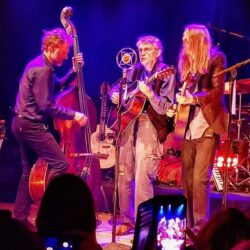
My brother and I buried our father. He passed away in the spring, and we had a really nice service. My father was a retired scientist and professor, a biologist in Colorado, but he was also throughout his childhood and my childhood a great musician and always played for the love of it. He knew 400 folk songs and entertained us when we were kids, entertained anybody who would listen. That was really good about him. He recorded some records and played with John Hartford and Joan Baez. He went to high school and college with them respectively, so had a rich musical background.
Anyway, we had this service at the retirement community he lived in. He had a lot of friends there, and he put together this wonderful music program. Some of his friends played at the service, and it really, really moved me. It really made me miss my dad the most. As a professional musician, sometimes you lose sight of what music is for, you know. It’s for connection and community. I’m really passionate about that concept. Anytime you’re playing music, whether it’s to be communal with the other musicians or the audience, it’s all about connection. People come to the shows and they may have different religious and political backgrounds, but they can all connect with the music and all agree on it a lot of times. I love that.
It’s good you can continue to value that connection as the years go by.
Sometimes I forget how important the work is because I’ve sacrificed a lot. With all the traveling, I miss my family at home. Sometimes I’d be gone for a couple weeks thinking, what the heck am I doing? And then somebody will come and say, hey, your music really got me through a tough time. That wakes you up and reminds you we’re doing important work. It’s connecting people and healing people. I don’t say that in an egotistical way. It’s more to validate all the sacrifices that we as musicians put in. It’s not just so people will clap for us, you know?
It’s apparent you are aware of a responsibility to always put forth your best effort.
Definitely. You know, connection is something that’s lacking in this day and age. I mean, not just in music, but in American society and the world, as well.
So, making those connections to you perhaps feels like a victory?
It’s a victory and everybody wins. And it doesn’t hurt anybody.
Speaking of your father, is there one song in particular that reminds you of your dad?
Absolutely. And we played it at the service, a recording of him doing ‘John Henry,’ the classic folksong. You know, versus the steam drill. I don’t know if you know that story. My dad used to play the hell out of that song. I have some great old recordings, including an album he made as a 20-year-old college student. He went into a studio and made an album of just him playing solo and singing folk songs. It is so good, and it’s so convincing. It’s nice to hear the crackle of the record. He made it in the mid-to-late Fifties. So, all we have it on is a record, and we had to digitize it, of course, but it’s just a scratchy old record.
Anyway, I associate that with my father but lots of other things. I remember my mom’s request for him was always ‘Irene Goodnight.’ So, he would sing that to her. But he knew ’em all, like the whole repertoire of that late Fifties, early Sixties, what Bob Dylan and Joan Baez and folks like that were doing, Even Harry Belafonte, he knew all the Calypso songs. He would sing in voices, in accents and sing tongue twisters, like Tom Lehrer’s song. But ‘John Henry’ was the one.
It’s interesting you mention John Hartford. I was doing an interview with Tony Trischka, who told me the story of the tapes that became “Earl’s Jam.” You’ve probably heard it told, but the tapes were of Earl Scruggs and John Hartford jamming, recorded onto cassette tape. While they were playing, John would routinely break out a little jig.
Well, my father went to high school in St. Louis with John Hartford, and they had a band together. They were friends throughout their lives. After high school with Hartford, he went to college and met Joan Baez. He had a radio program, a folk singer’s program and had Joan Baez on there. My dad actually recorded an album with Joan Baez. Both of those people went into professional music, and I think my father was as good as both of them. But he ended up becoming an academic and went to graduate school instead of pursuing music. He had that side of him that wanted to be a musician. He was always playing guitar around the house and singing songs.
He must have been very proud of his sons, becoming what he couldn’t, probably because he had a family to raise.
I think he got vicarious pleasure from his sons becoming professional musicians. Some of the best memories I have are of him coming out to see my brother and I play. We have some great footage of him actually sitting in with us, and some photos of us playing hometown shows in Boulder, Colorado. Those are powerful things.
Getting back to the connections and disconnections and, as you’ve said, being in kind of that bubble where you can create and play your music. I’m thinking of your first solo album, and I guess it would be your pandemic album. You could say that was created in a bubble. It’s kinda like the NBA had their playoffs in a bubble in Orlando during the pandemic year. You had your bubble in the recording studio.
I think the main difference is that back during the actual bubble of the pandemic, everything was stopped. Right. At least for people in my business, there was nothing happening other than people trying to put on shows over the Internet, which was not that satisfying. But it was better than nothing, for sure. You had this sense of, well, there’s nothing else to do, and you’ve got all the time in the world. Now the rat race is in full swing. So, for me to make this second album was more challenging because I have a full-time situation with the Wood Brothers, and I have a family at home. Finding the time to do solo things is tricky. This was a little different, maybe even better because when you have time limitations and deadlines, you can be more efficient or more focused. You don’t have as much time to think. For me, that’s a good thing as thinking is the last thing I want to do.
Looking back on those songs from that first record, do you evaluate them like, this one worked better and this one maybe not so much?
Off the first record, well, let’s see. For me, the favourite one’s called ‘Came from Nothing.’ I don’t know if anybody likes that song but me. ‘Kindness’ and ‘Fine Line’ are some good ones, too. ‘Molasses’ is one I play at almost every show. There’s a cover, ‘The Battle is Over (but the World Goes On)’ that’s another we always play.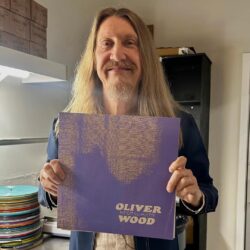
Hearing you talk about songs and songwriting; I get the impression that it happens automatically without a lot of thought going into it. But it can’t be as easy as it sounds.
Don’t I wish it was that easy. But yeah, I think the good ones or the most satisfying songs have very little thought or effort, and they seem just to come flowing out. I know people who are much better at it than me as far as just writing a song in A in an hour or a day. I’ve definitely come a long way in terms of being able to be a little less judgmental, a little less precious about things, and trusting my instincts. There’s something to that. As artists, our biggest enemy is judging and crafting too much. That said, every song I’ve ever written has needed some of that. At some point, you have to finish it and give it a form. Ideally, you’re in a non-judgmental mode when you’re trying to say something, and if I can let my subconscious do all the work, that’s gonna be the best, most honest piece of work.
You could call that Zen and the art of songwriting.
You’re just doing it and not thinking about it. I don’t know if thinking’s the right word, but you’re not thinking like, that’s awesome. Or you’re not like, I suck. You know? It’s neither one of those things.
Just getting your mind out of the way isn’t necessarily not thinking. It’s just letting whatever energy is gonna come through you, come through.
Good point. Yeah. I think the goal is to be sort of childlike and to follow and discover rather than try to control and think, you know, what you’re doing. There’s a humility to it and a trust that for me does not come easily. I’m still working on that.
Well, everybody could say that. The way that Stephen King writes novels is, he just sits down and it comes through him. He barely remembers what happened. That’s hard to imagine if you can’t experience it.
That’s a lot. Writing a novel is much more than writing a three-minute song.
You tend to pack a lot of meaning into a four or five-word sentence over three minutes. I’m not trying to make it sound facile, but it amazes me how you can express a complicated thought with just a few words.
I appreciate that. I was just thinking about what you said about Stephen King, and how he doesn’t remember. I can relate to that when I’ve gotten lucky and gotten something good down. It’s almost like, where did that come from? I don’t remember thinking about that. And it happens with performances, like really good live shows. Sometimes I don’t remember them happening. I just know I felt very comfortable the whole time.
Something you have said about songwriting, that you like trying weird things like substituting vocals for horns. Could you explain that more?
For lack of a better term, that was just a way of saying, let’s do different. Let’s do things that are counterintuitive and experiment and see what happens. I think doing a solo album, in finger quotes, because what it really just means is I’m collaborating with some different people outside of the Wood Brothers, which is my normal thing that I love and is the foundation of what I do. But in having this freedom to do a solo album when it’s not really my bread and butter allows me to get a little more risky and free to experiment. I’m really lucky ’cause we have a studio that’s right up the street from my house, and so it’s kind of like a fun clubhouse and laboratory.
Experimentation would get very costly if you’re renting studio time.
Exactly. Jono Rix, who’s also in the Wood Brothers, was my producer, and we pushed each other to try different things. For example, I asked Jono to play a little less drum kit and a little more percussion. And like you said, we did some horn parts with vocals, but we also did like percussion parts with vocals, imitating shakers and tambourines with vocals. I also experimented with some guitar sounds, trying to get sort of the worst guitar sound possible. Here in Nashville, there’s a lot of pristine, beautiful guitar sounds and virtuoso playing. I thought, well, what’s the opposite of that? Well, here’s a crappy guitar sound, and I’m gonna play a stupid guitar riff.
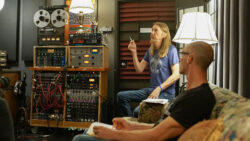
I could have helped you out with that. Sign me up next time.
(laughing) I’ll keep that in mind. I wanted to be more experimental and childlike. And I’m not saying anything revolutionary happened; it just felt like nice to step out of the box and lean into that feeling of weirdness, even though it’s not that weird. It’s not like Avant Garde or anything. It’s just something I haven’t done before. We had a fife and drum song on there where there’s no bass and there’s no drum kit. There’s just a bass drum, like a marching drum and a fife player, Marcus Henderson, and tuba, baritone sax from Steve Berlin of Los Lobos. Just sounds I don’t normally get to work with. It was a bit of a stretch but it felt really good and fresh.
Is that the same Marcus Henderson who’s playing with the latest incarnation of the Marshall Tucker Band?
Yep. He and I used to play in my band when I lived in Atlanta. King Johnson was kind of like a New Orleans funk, groove band like The Meters or Little Feat.
Have you stayed in touch with the guys from the band, outside of Marcus?
We’re all still friends, but we live in different parts of the country. One guy passed away. That band was where I got my schooling in music, learning to write songs and learning to sing in front of people.
Are you now in the room where the Fat Cat sits in the window?
I am not currently, but it is right around the corner.
So, who is the actual Fat Cat?
Well, I have two cats and the fat one’s name is Pumpkin. But there really is an armchair in the room that’s mentioned in the song and a cup of coffee and a fat cat silhouette in the window. During the time that I was writing these songs, I have a ritual in the morning of sitting in that chair with my coffee and just writing whatever comes to me. And, a couple of songs on there refer directly to that perch.
I’m picturing four legs and kind of chubby, something about arms akimbo.
Yeah. Well, that’s my arm. I’m all akimbo in the chair, actually. As writers, a lot of times we need something to get things started. And oftentimes to get a song started for me, I’ll hear somebody say something or a melody will come into my head or a lyric and I’ll write it down. Or if I’m lucky, I’ll just keep going and write a whole verse or a chorus, maybe a whole song. Sometimes it’s a blank slate. So, I come downstairs and make my coffee, sit in my chair with my notebook just look around. It’s kind of that simple. You just need something to get going. So that song, which is called ‘Little Worries,’ it mentions the Fat Cat silhouette and sprawling sideways in my armchair all akimbo. Then there’s another song, ‘Light and Sweet,’ which is the first song on the album. It starts out about a sparrow outside the window talking on the phone to his lawyer. I actually saw a sparrow outside the window, and I thought, what if he’s talking on the phone to his lawyer about his upcoming divorce? Right? Again, it was sort of a catalyst to get the story started.
That song has a ‘Chocolate on My Tongue’ or ‘One Drop of Truth’ vibe. My guess is you have a sweet tooth.
I definitely do. What I like about those songs is that they came to be in that way. Some people say write something that’s real. Write about something truthful. I think even just putting yourself in that mode and then going into a fantasy of some kind is great as opposed to having a theme in mind or already knowing what you’re trying to say. I love when you can write something and basically finish it and then look back and say, what is the song about? Some images do that in a beautiful way. Like the Fat Cat silhouette. You asked me earlier what does it represent? Well, I am into the ambiguity, and I’d rather not say what it represents to me.
Really. Well, now that’s going to bug me the rest of the day.
Because I’d like you to have your own interpretation of it. The best analogy for me is when you read a book, let’s say you read a Stephen King book, you get to make your own images. Right? He describes them but you get to picture it as opposed to the movie, which may be hit or miss. But the movie makes you commit to some images that are not your own, you know? I like that a song has lyrical images that you can do what you want with them as a listener and as the writer. I like the ambiguity of the Fat Cat silhouette. I’ve definitely had songs of mine that were interpreted completely differently than I intended, and I loved it. Most of the time anyway.
Your publicist supplied a sheet with little blurbs you wrote about each song on “Fat Cat Silhouette.” Which is very helpful and informative. But I listened to the record first just to have a feel for the songs, then read what you had to say. Sometimes it jived with what I heard, other times it was like 180 from it. But as you said, that’s a good thing. You know that your listener is actually getting something out of the music, rather than you saying what they should be getting out of it.
Absolutely. Always in those little song blurbs that I need to write for the publicist, I’m pretty careful not to say what I think the song is about. When people ask, what’s that one about? I tend to give vague answers, not to be cryptic or anything, just because I don’t wanna ruin it, you know?
Recently while interviewing Ben Sidran, he talked about riding around with his dog sticking his head out the car window. He compared the dog brain to the human brain. The human brain is 98% looking out the window and 2% thinking about things, whereas the dog brain is 100% looking out the window.
I see what he’s saying. That’s how my song ends up. You let the cat out and follow him. He’s catching sunbeams and chasing butterflies. There’s the wisdom. That’s exactly how you do it. You don’t sit around and think, you just play or look out the window or chase butterflies, whatever.
What gave you the idea to record ‘Fortune Drives the Bus’ on an iPhone in your backyard? Was it the bourbon?
I’m not gonna say. There was one night where my wife and I were sitting out there entertaining someone, just hanging out and sipping bourbon. And I started writing it. I made a little voice memo on the phone that sounded so cool, and you could hear the fire crackling. I thought that instead of taking this one to the studio, I’m just gonna record it. That’s the way it was born, and that’s the way it should sound. I liken it to a field recording. I’m a big fan of all the Alan Lomax recordings, and an iPhone is a pretty amazing tool for things like that. You can make recordings that sound just like your porch sounds. I love that.
The character of Mr. Fortune is very cool. He reminds me of some super villain like Mr. Nobody on “Doom Patrol.”
You know, he sounds like a DC comics character or something. Well, it was actually my wife’s school bus driver back in the day who was named Mr. Fortune, and that always stuck with me.
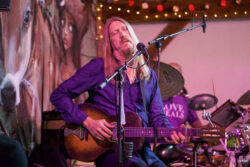
Ted Pecchio plays bass on the album. How did it feel after all these years with your brother Chris playing bass to make an album with another bassist?
Well, Ted and I go way back to Atlanta days when we were playing together. We’re good friends.
With Colonel Bruce Hampton?
Yeah, Colonel Bruce Hampton is the connection. It’s nice for me to play and collaborate with other people. You grow as a musician and get some different angles on things, and then bring what I learned back to the Wood Brothers. Ted is a great bass player, completely different from my brother. Chris is the best bass player I’ve ever played with; he’s incredible. I’d say the same about Ted in just a different way. I like not only playing, but writing with different people and having different musicians come in and play. So, again, the solo record is really just collaborating with different people. I paid for it, so I’m calling it my album, but, I had a lot of great help making it.
You have played with Donnie McCormick.
He was my mentor and a huge inspiration.
There is a video on Facebook of The Fat City Wildcats band playing the Northside Tavern in Atlanta. He’s banging on that contraption of his, a chicken coop with bones and antlers tied to it, as a percussion instrument.
Look, I’m gonna show you something. This is a rendering that he did. That’s Donnie McCormick with his chicken coop, if you can see it, and me on guitar and my friend Charlie Rutten on bass. We used to have a Tuesday night gig at this little bar. Donnie’s, like, maybe my favourite guy ever. Amazing mentor. Those were some of the best times ever.
At the time of the interview, Hurricane Helene had ravaged the western part of North Carolina, it’s harrowing winds and rain leaving over 100 people dead and at least 100 more still missing months later. The devastation there is unimaginable. Many artists and other people in the music community have helped the relief effort. Given that the federal agencies were woefully unprepared and underfunded, it is thanks to average citizens that many lives were saved. The rebuild effort is funded through several non-profit organizations. The Community Foundation of Western North Carolina is one with a good reputation.


